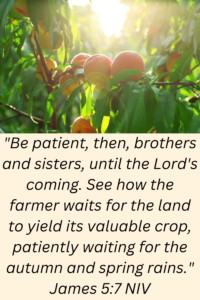How to Bear Fruit as a Christian: Cultivating a Life of Abundant Spiritual Harvest

“Be patient, then, brothers and sisters, until the Lord’s coming. See how the farmer waits for the land to yield its valuable crop, patiently waiting for the autumn and spring rains.” – James 5:7 NIV
As Christians, bearing fruit is not merely a metaphorical concept; it’s a profound reflection of our faith and relationship with God. Just as a tree is known by its fruit, believers are recognized by the qualities and actions they manifest in their lives. Let us explore the significance of bearing fruit in the Christian life, the steps to cultivate fruit of the Spirit, and the potential hindrances to bearing fruit for Christ.
What is meant by the Fruit of the Spirit in Christian Life?
The “fruits” in the Christian life encompass the attitudes, behaviors, and virtues that exemplify a close relationship with God and a transformed heart. These fruits are outlined in passages such as Galatians 5:22-23, where they are referred to as the “fruit of the Spirit”:


“But the fruit of the Spirit is love, joy, peace, forbearance, kindness, goodness, faithfulness, gentleness and self-control.” – Galatians 5:22-23 (NIV)
These attributes are the natural outpouring of a life rooted in God’s love and grace. They not only benefit the believer but also impact the lives of others, serving as encouragement and testimony to the transformative power of faith.
How to Bear Fruit as a Christian: Avoiding Hindrances
Not repenting of sins and confusing sin with our identity in Christ can become hindrances to bearing fruit as a Christian.
1. Not Repenting
One significant hindrance to bearing fruit is refusing to repent by confessing sin and saying “sorry” to God. Unconfessed sin can hinder our spiritual growth and block the fruit of the Spirit from manifesting in our lives. It is crucial to acknowledge our sin and seek God’s forgiveness.
So, this a moment to get really real with each other and for me to leave a confession for you to read. There is a difference between saying sorry to someone and actually feeling sorry. Remember that childhood moment where your parent told you to say, “I’m sorry” to make everything better. You may have said you were sorry, but did you mean it? Even as an adult, there have been moments where I have said I was sorry but only half-heartedly meant it.
Repentance is not just confessing sin and telling God you are sorry. Repentance also includes a genuine feeling of being sorry for anything you have done which separates you from God. Repentance is the confession you make to fix the broken relationship that sin creates between you and God.
I noticed that I had Matthew 3: 8 highlighted in almost every version of my Bible app. Matthew 3:8 (NIV) says, “Produce fruit in keeping with repentance.”
How interesting that to produce fruit, we must keep with repentance.
2. Confusing Sin with Identity
Another obstacle is confusing our sin with our identity. This can lead to living in guilt and shame, preventing us from experiencing the freedom and transformation Christ offers. Instead, we should remember that in Christ, we are new creations (2 Corinthians 5:17) and embrace the grace that covers our mistakes.
To further explain this confusion, remember that there are many who repent of their sins but still live under the lie that “I am unworthy”. Even when Christ pours forgiveness, grace, and love on the repentant heart, many fail to receive and experience the fullness of Christ’s love due to a lack of identity. We must begin to identity ourselves the way that Christ sees us.
Romans 8:16 (NIV) says, “The Spirit himself testifies with our spirit that we are God’s children.” This is exactly how God views our identity–as His own beloved child!


How to Bear Fruit as a Christian
1. Godly Repentance (Not in a Shame or Worldly Sense)
True repentance is a foundational step in bearing fruit. However, it’s essential to understand that repentance in the Christian context is not about shame or the world’s perception. Rather, it’s a turning towards God and away from sinful behaviors. Romans 2:4 emphasizes God’s kindness and patience as motivations for repentance:
“Or do you show contempt for the riches of his kindness, forbearance, and patience, not realizing that God’s kindness is intended to lead you to repentance?” – Romans 2:4 (NIV)
To bear fruit as a Christian, one must intentionally nurture faith in Christ. This involves maintaining a consistent prayer life, studying the Word, and seeking fellowship with other believers. Isaiah 59:2 reminds us that sin can create a separation between us and God:
“But your iniquities have separated you from your God; your sins have hidden his face from you, so that he will not hear.” – Isaiah 59:2 (NIV)
By constantly aligning ourselves with God through repentance and seeking His presence, we allow the Holy Spirit to work in us, producing the fruit of righteousness.
2. To Bear Fruit as a Christian, You Must Listen Well
To bear fruit as a Christian, we must add the discipline of listening well to our spiritual walk with Christ.


John 10:27 (NIV) says, “My sheep listen to my voice; I know them, and they follow me.”
Hebrews 4:12 (NIV) says, “For the word of God is alive and active. Sharper than any double-edged sword, it penetrates even to dividing soul and spirit, joints and marrow; it judges the thoughts and attitudes of the heart.”
John 14:26 (NIV) says, “But the Advocate, the Holy Spirit, whom the Father will send in my name, will teach you all things and will remind you of everything I have said to you.”
The above three verses indicate that God is still speaking through His Word and the Holy Spirit. It is our job as sheep to listen to what God is speaking. When we listen well to what God is saying, then we will bear fruit as a Christian.
3. What the Bible says to Bear Fruit as a Christian
Biblical figures provide us with tangible examples of what it means to bear fruit in the Christian life. Consider Jeremiah 2:13, where God laments the people’s forsaking of Him, the “spring of living water,” and their pursuit of empty substitutes:
“My people have committed two sins: They have forsaken me, the spring of living water, and have dug their own cisterns, broken cisterns that cannot hold water.” – Jeremiah 2:13 (NIV)
On the other hand, Ezekiel 17:8 illustrates the flourishing of a planted seed:
“It had been planted in good soil by abundant water so that it would produce branches, bear fruit, and become a splendid vine.” – Ezekiel 17:8 (CSB)
These passages show that bearing fruit involves staying connected to God and allowing Him to nurture us into fruitful vessels.
To bear fruit as a Christian is a continuous process that requires intentional effort, rooted in a deep relationship with God. It’s about producing the qualities and actions that align with God’s nature and purpose. By practicing godly repentance, nurturing our faith, and avoiding hindrances like unrepentant sin and misplaced guilt, we can bear fruit that glorifies God and impacts the world around us. Just as a tree flourishes when tended to, our lives flourish as we remain connected to the true Vine, Jesus Christ.
Join us on a 30-Day Faith Journey
Follow us on Pinterest for more Bible Study topics
